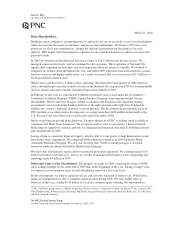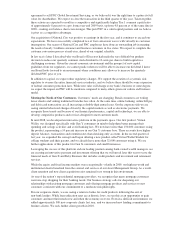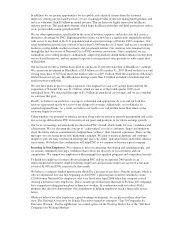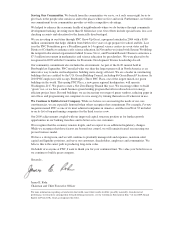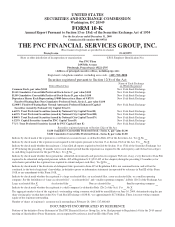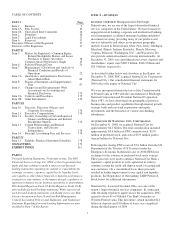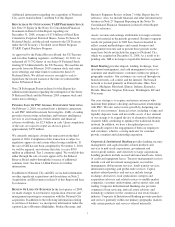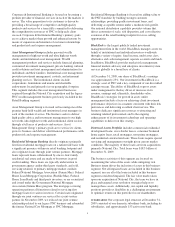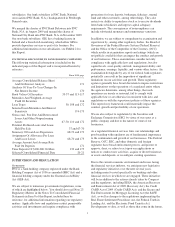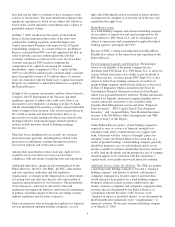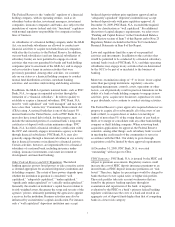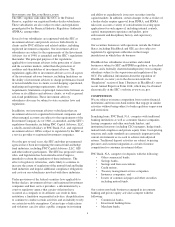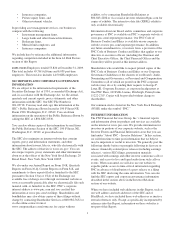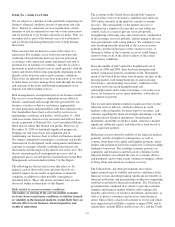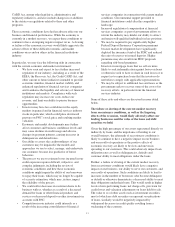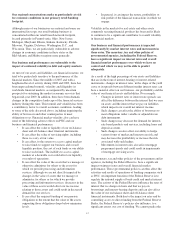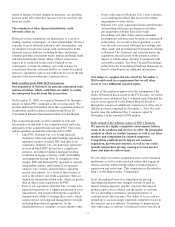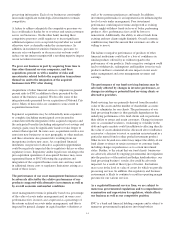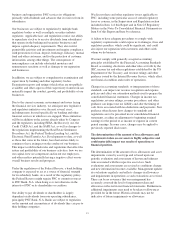PNC Bank 2009 Annual Report Download - page 9
Download and view the complete annual report
Please find page 9 of the 2009 PNC Bank annual report below. You can navigate through the pages in the report by either clicking on the pages listed below, or by using the keyword search tool below to find specific information within the annual report.
subsidiaries. Our bank subsidiary is PNC Bank, National
Association (PNC Bank, N.A.), headquartered in Pittsburgh,
Pennsylvania.
We merged the charter of PNC Bank Delaware into PNC
Bank, N.A. in August 2009 and merged the charter of
National City Bank into PNC Bank, N.A. in November 2009.
Our non-bank subsidiary, GIS, has a banking license in
Ireland and a branch in Luxembourg, which allow GIS to
provide depositary services as part of its business. For
additional information on our subsidiaries, see Exhibit 21 to
this Report.
STATISTICAL DISCLOSURE BY BANK HOLDING COMPANIES
The following statistical information is included on the
indicated pages of this Report and is incorporated herein by
reference:
Form 10-K page
Average Consolidated Balance Sheet
And Net Interest Analysis 171
Analysis Of Year-To-Year Changes In
Net Interest Income 170
Book Values Of Securities 33-37 and 113-117
Maturities And Weighted-Average
Yield Of Securities 116
Loan Types 30, 108 and 172
Selected Loan Maturities And Interest
Sensitivity 174-175
Nonaccrual, Past Due And Restructured
Loans And Other Nonperforming
Assets 67-70, 110 and 172
Potential Problem Loans And Loans
Held For Sale 37 and 67-70
Summary Of Loan Loss Experience 68-70 and 173
Assignment Of Allowance For Loan
And Lease Losses 68-70 and 173
Average Amount And Average Rate
Paid On Deposits 171
Time Deposits Of $100,000 Or More 132 and 175
Selected Consolidated Financial Data 20-21
SUPERVISION AND REGULATION
O
VERVIEW
PNC is a bank holding company registered under the Bank
Holding Company Act of 1956 as amended (BHC Act) and a
financial holding company under the Gramm-Leach-Bliley
Act (GLB Act).
We are subject to numerous governmental regulations, some
of which are highlighted below. You should also read Note 23
Regulatory Matters in the Notes To Consolidated Financial
Statements in Item 8 of this Report, included here by
reference, for additional information regarding our regulatory
matters. Applicable laws and regulations restrict permissible
activities and investments and require compliance with
protections for loan, deposit, brokerage, fiduciary, mutual
fund and other customers, among other things. They also
restrict our ability to repurchase stock or to receive dividends
from bank subsidiaries and impose capital adequacy
requirements. The consequences of noncompliance can
include substantial monetary and nonmonetary sanctions.
In addition, we are subject to comprehensive examination and
supervision by, among other regulatory bodies, the Board of
Governors of the Federal Reserve System (Federal Reserve)
and the Office of the Comptroller of the Currency (OCC),
which results in examination reports and ratings (which are
not publicly available) that can impact the conduct and growth
of our businesses. These examinations consider not only
compliance with applicable laws and regulations, but also
capital levels, asset quality and risk, management ability and
performance, earnings, liquidity, and various other factors. An
examination downgrade by any of our federal bank regulators
potentially can result in the imposition of significant
limitations on our activities and growth. These regulatory
agencies generally have broad discretion to impose restrictions
and limitations on the operations of a regulated entity where
the agencies determine, among other things, that such
operations are unsafe or unsound, fail to comply with
applicable law or are otherwise inconsistent with laws and
regulations or with the supervisory policies of these agencies.
This supervisory framework could materially impact the
conduct, growth and profitability of our operations.
We are also subject to regulation by the Securities and
Exchange Commission (SEC) by virtue of our status as a
public company and due to the nature of some of our
businesses.
As a regulated financial services firm, our relationships and
good standing with regulators are of fundamental importance
to the continuation and growth of our businesses. The Federal
Reserve, OCC, SEC, and other domestic and foreign
regulators have broad enforcement powers, and powers to
approve, deny, or refuse to act upon our applications or
notices to conduct new activities, acquire or divest businesses
or assets and deposits, or reconfigure existing operations.
Due to the current economic environment and issues facing
the financial services industry, we anticipate new legislative
and regulatory initiatives over the next several years,
including many focused specifically on banking and other
financial services in which we are engaged. These initiatives
will be in addition to the actions already taken by Congress
and the regulators, including EESA, the American Recovery
and Reinvestment Act of 2009 (Recovery Act), the Credit
CARD Act of 2009 (Credit CARD Act), and the Secure and
Fair Enforcement for Mortgage Licensing Act (the SAFE
Act), as well as changes to the regulations implementing the
Real Estate Settlement Procedures Act, the Federal Truth in
Lending Act, and the Electronic Fund Transfer Act.
Developments to date, as well as those that come in the future,
5

